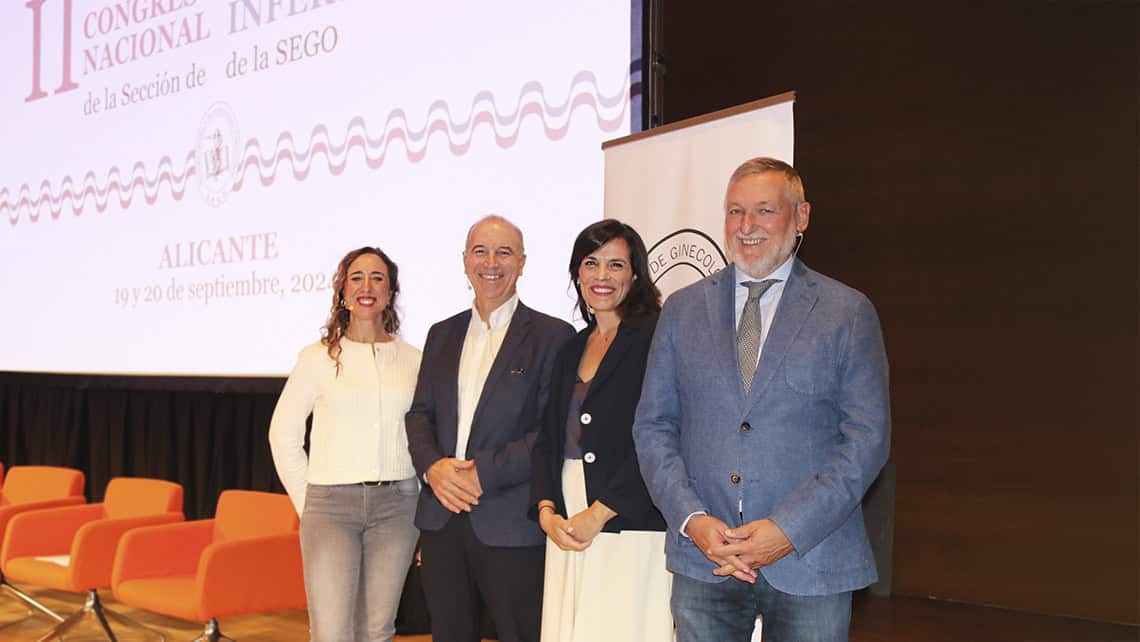Delayed parenthood and new reproductive needs: the 2nd National Infertility Congress warns of the birth crisis
September, 25th 2024

- ‘The replacement rate is 2.1 children per couple, but in Spain the rate is only 1.15 children’.
- ‘Fewer children are being born today than during the Spanish Civil War’.
- Alicante becomes the epicenter of the fight against infertility.
- The Instituto Bernabeu team, led by Dr. Andrea Bernabeu, presents the main scientific advances in reproductive medicine.
Spain is facing a serious demographic threat due to new social trends and the low fertility of its citizens. This is one of the conclusions of the Sterility and Infertility Section of the Spanish Society of Gynecology and Obstetrics (SEISEGO in Spanish) National Congress, where the main advances in reproductive medicine are presented. The event was held from 19 to 20 September in the Diputación de Alicante auditorium (Paseo de Campoamor, s/n, 03010 Alicante) and was attended by fertility experts with a high national and international prestige.
At this congress, Instituto Bernabeu‘s specialists in reproductive medicine gave several presentations on the latest scientific advances in the sector and emphasized the most important challenges in fertility, highlighting the birth rate crisis.
‘The replacement rate, i.e. the minimum fertility required for a population to maintain itself indefinitely over time without decreasing its volume, is 2.1 children per couple, but in Spain it is barely 1.15 children per couple’, explains Dr. Andrea Bernabeu, director of Instituto Bernabeu and president of the SEISEGO Organizing Committee. This adds to the fact that many couples are finding it difficult to become parents; in fact, the WHO has warned that 1 in 6 people in the world have problems conceiving.
Infertility, a pressing challenge in Spain
Spain is going through a birth crisis. In 2023, only 322,075 children were born in the whole country, a figure that marks historic lows and represents 24.3% less than a decade ago. In addition, delayed childbearing is becoming increasingly common: 40.1% of mothers are aged 35 or older when giving birth, and births to women over 40 have risen by 18.7%, now accounting for 8.1% of the total. The problem is that chances of becoming a mother after the age of 40 are less than 20%, creating a warrying context for experts. This has meant that, according to the experts at the congress, fewer children are being born today than during the Spanish Civil War.
‘Age is a key factor affecting both the quality and quantity of oocytes in women, which significantly reduces the chances of pregnancy as they get older,’ stresses Dr. Ana Fuentes, member of the Congress’ Scientific Committee and of Instituto Bernabeu, who moderated the module: The oocyte, a limited asset. Dr. Fuentes stresses the urgency of addressing the impact of ovarian ageing and the importance of early intervention in fertility treatments.
The male factor is also in crisis, with a 51% drop in sperm concentration worldwide, a trend that continues to worsen. Leyre Herrero, from Instituto Bernabeu, is the leading figure of ‘1 in 1 million: sperm selection and therapeutic improvements’, a presentation where she explained the new techniques to select better quality spermatozoa, increasing the probability of success in fertility treatments.
Instituto Bernabeu, leader in research
In addition, Dr. Andrea Bernabeu, moderated a module that aimed to provide an update on PGT-A (Preimplantation Genetic Test for Aneuploidy). This test makes it possible to detect chromosomal abnormalities in embryos before implantation, an advance that improves success rates in assisted reproduction treatments and minimizes the risk of miscarriages. In the same module, Belén Lledó, scientific director of the molecular genetics laboratory at Instituto Bernabeu BioTech, leads the presentation ‘New PGT-A’, highlighting the innovations in these genetic techniques, and moderates the debate on the controversies of carrier testing, addressing the ethical challenges facing reproductive medicine today.
Along the same lines, Dr. Rosa M. Daurelio explained the ‘Therapeutic strategies in recurrent implantation failure (RIF)’ in her talk, a condition that affects women who, after several IVF attempts, fail to successfully implant the embryo.
The firm commitment to research in reproductive medicine, combined with the training of gynecologists and residents, remains key to anticipate the fertility problems of the present and the future. ‘The 2nd SEISEGO Congress is a unique opportunity to celebrate life and share experiences on the challenges faced by reproductive medicine professionals in an increasingly diverse social context’, explained Dr. Andrea Bernabeu in an institutional welcome accompanied by Rocío Juliá, Dean of the Faculty of Health Sciences of the University of Alicante; Professor Domingo Orozco, Vice-Rector of Planning and Social Responsibility of the Miguel Hernández University; and the President of COMA and member of the Committee of Honor, Dr. Hermann Schwarz.
